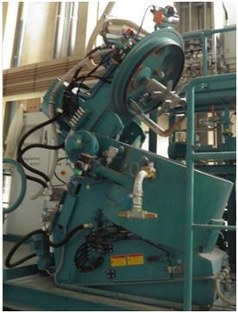Concrete technology
Overview
The performance of cement-based materials is highly dependent on the microstructure which is formed by hydration. The concrete technology group of prof. dr. ir. Geert De Schutter is focussing on advanced cement based materials with specific properties, such as for example self-compacting concrete. Other research topics include hydration, microstructure, transport properties, durability, rheology and mechanical properties of (self-compacting) concrete. Alternative mixing procedures and pumping techniques are investigated.
An overview of some current and recent research topics is given hereafter.
- Self-Compacting Concrete (SCC)
Since many years, Self-Compacting Concrete (SCC) is one of the major research topics within the Magnel Laboratory for Concrete Research. Initially, the mix design was studied, linked to hydration studies. Based on microstructural studies, mechanical and durability properties have been fundamentally studied. Now, focus is mainly on rheological studies, in view of the development of new casting procedures. One of the projects is focussing on the fundamental control of concrete rheology by optimising mixing energy and superplasticizer design, based on FBRM as a fundamental experimental technique. Some other important projects linked to rheology of fresh cementitious materials are mentioned in the following bullets.
- Smart Casting of Concrete Structures by means of active rheology and stiffening control (“SmartCast”) (2016-2021)
Recently, Prof. G. De Schutter was awarded an ERC Advanced Grant for the project “SmartCast”. This project is aiming for Active Rheology Control (ARC) and Active Stiffening Control (ASC) during casting of concrete, in view of more automated production of concrete structures. Some more information can be found on the general website of Ghent University: Geert De Schutter – SmartCast.
Also watch our short video introduction to the SmartCast project!
- 3D-Printing and Digital Fabrication of Concrete (2018-2023)
Prof. G. De Schutter is the principal investigator of the Ghent University Concerted Research Action “Generic materials study towards high quality advanced medical, food and engineering 3D structures”. The project also includes research groups from Materials Science and Engineering (Prof. L. Cardon), Food Technology and Engineering (Prof. K. Dewettinck), and the Department of Morphology of the Faculty of Veterinary Medicine (Prof. P. Cornillie). The aim of the project is to provide a fundamental understanding of extrusion based additive manufacturing and 3D casting of multicomponent materials toward high quality end products. Thanks to a generic research methodology, covering common challenges on rheology and solidification, the 3D product quality of a wide pallet of materials will be realised, including thermoplastic/thermoset polymers, self-compacting concrete, and fat-based food dispersions.
- Alternative binders for cement based materials
The use of alternative materials as addition and/or replacement of cement, leads to new binary and ternary cement based materials with modified microstructure development. The resulting transport properties are modelled in two different research projects, with special attention to microstructure development and the influence of the interfacial transition zone between matrix and aggregate. Besides that, the influence on the durability is being analysed, and this with respect to the developed interface zone as well as with respect to the general microstructure. In parallel, the application of artificial porous pozzolanic materials for mitigation of the autogenous shrinkage cracking of high performance concrete is studied.’ Furthermore, the hydration of cementitious materials under the influence of physical fields is also one of the current research topics.
- Radioactivity
The influence of chemically detrimental processes such as radioactive radiation on the transport properties of self-compacting concrete are studied as well (in cooperation with SCK-CEN). In this regard, the modelling of the influence of these processes on the microstructure are of major importance.
- Creep and shrinkage of hardened concrete
For high rise buildings, creep of hardened concrete is an important factor in determining the final deformations. An accurate modelling for this is indispensable. In cooperation with Tongji University (China) this problem is being focussed on.
- Durability
Often, small cracks in the concrete are being formed in an early stage, e.g. due to shrinkage or thermal effects. These cracks, although often limited in crack width and depth, can have an important effect on the durability of the concrete due to the accelerated penetration of aggressive substances. Fundamental studies also focus on the penetration of chlorides in concrete, and their interaction with the electric double layer (in cooperation with Hunan University). Furthermore, in-depth studies are ongoing concerning the damage mechanism in case of alkali silica reaction, and concerning the carbonation of cementitious materials containing fly ash. In a joint research project with the Department of Engineering Geology of the Faculty of Sciences, the frost damage in concrete and natural building stones is fundamentally studies at the microstructural level, involving advanced techniques like micro-tomography while freezing.
A vacuum mixing installation for cement based materials is available in the Magnel Lab for Concrete Research. This equipment, obtained through a Hercules financing project, is currently unique in the world with respect to research on concrete. By means of this high-tech installation, new steps can be made in the development of advanced cementitious materials.
